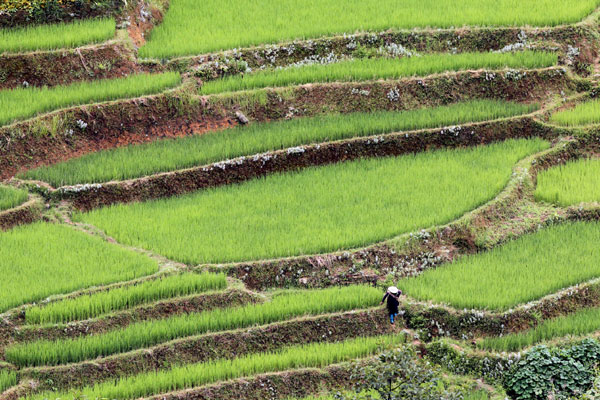Terraces on top of the world
Updated: 2013-07-26 06:35
By Hu Yongqi and Li Yingqing (China Daily)
|
||||||||
The addition of a site in Yunnan province to the World Heritage list is likely to guarantee the continuing survival of traditional Hani culture, as Hu Yongqi and Li Yingqing report from Honghe, Yunnan.
 |
|
A bird's eye view of Hani rice terraces in Yuanyang county, Yunnan province. [Photo by Zhang Wei/China Daily] |
Thick fog enveloped the mountains and hills in Xinjie township, Yuanyang county, on a morning in early July, a noted period of heavy rains in Yunnan province. When the wind blew, the Hani rice terraces dominated the view as they climbed one above the other, providing a picture-perfect example of traditional land layering.
Not far from the rice paddies, Li Zhengfu, 38, was one of many early birds up and about in Dayutang village at 7 am. As a member of the local catering industry, Li was busily preparing dishes for the tourists who would soon arrive in their droves.
His restaurant, located in his three-story home and subsidized by the local government, can serve traditional Hani cuisine to 120 people at each sitting. Li and his family can earn an annual net income of more than 40,000 yuan ($6,515), almost double the wage of a construction worker.
Fortune smiled on Li and the other residents of Yuanyang, the heartland of the Hani people, when the 1,300-year-old terraces were added to the UNESCO World Heritage List on June 22. The site is the first to be named after an ethnic group and brings the number of World Heritage sites in China to 45, second only to Italy.
Preservation is key
The Hani terraces have been superbly preserved in four counties of Honghe Hani and Yi autonomous prefecture, across an area of 160,000 hectares. In Yuanyang alone, 16,000 hectares feed 82 villages.
The prefecture government first applied to be added to the UNESCO list in 2001, and although the process took 12 years, the hard work finally paid off.
Before 2009, old-fashioned dirt roads made travel difficult and a lack of decent vantage points prevented visitors from getting a good view of the paddies, especially in autumn when the water reflects sunlight like a mirror.
At the time, the food in the local restaurants was of poor quality and conditions were less than sanitary. A dearth of decent hotels meant tourism was restricted to day trips and visitors were forced to return to the county seat in Nansha township at night. Unsurprisingly, the farmers who cultivated the terraces derived little benefit from tourism.
- Leave a moment of peace for the Hani Terrace
- Hani terrace:a new World Heritage sitexia
- Stunning photos of Hani terrace
- Stunning photos of Hani terrace
- Hani terraces named UNESCO world heritage
- Hani terrace:a new World Heritage sitexia
- Terraces cultivate global recognition
- Hani rice terraces in UNESCO heritage
- Hani Rice Terraces wins World Heritage status

 Top DPRK leader meets Chinese vice-president
Top DPRK leader meets Chinese vice-president
 US does not plan decision on Egypt coup
US does not plan decision on Egypt coup
 Bo Xilai indicted for corruption
Bo Xilai indicted for corruption
 Korean War veterans return to peninsula
Korean War veterans return to peninsula
 Tourist safety a priority in S China Sea
Tourist safety a priority in S China Sea
 Death toll in Spain train crash rises to 77
Death toll in Spain train crash rises to 77
 Royal baby named George Alexander Louis
Royal baby named George Alexander Louis
 'The Grandmaster' takes center stage
'The Grandmaster' takes center stage
Most Viewed
Editor's Picks

|

|

|

|

|

|
Today's Top News
US does not plan decision on Egypt coup
Congress approves NSA spying program
Japanese PM unlikely to visit Yasukuni Shrine
Girl, 2, thrown to ground; suspect detained
Crackdown a bitter drug to herald changes
Indictment shows CPC's stance
China's VAT reform to benefit more businesses
Yum won't chicken out from expansion
US Weekly

|

|







